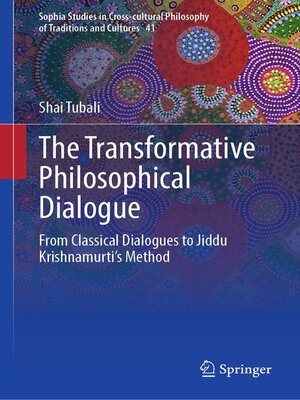The Transformative Philosophical Dialogue
ebook ∣ From Classical Dialogues to Jiddu Krishnamurti's Method · Sophia Studies in Cross-cultural Philosophy of Traditions and Cultures
By Shai Tubali

Sign up to save your library
With an OverDrive account, you can save your favorite libraries for at-a-glance information about availability. Find out more about OverDrive accounts.
Find this title in Libby, the library reading app by OverDrive.



Search for a digital library with this title
Title found at these libraries:
| Library Name | Distance |
|---|---|
| Loading... |
This book explores dialogue as a transformative form of philosophical practice by unveiling the method behind the unique dialogue developed by mystic and thinker Jiddu Krishnamurti (1895–1986). While Krishnamurti himself generally rejected the cultivation of systems and techniques, Shai Tubali argues that there are easily identifiable patterns through which Krishnamurti strove to realize his dialogical aims. For this reason, he refers to this method, whose existence has evaded Krishnamurti's followers and scholars alike, as the Krishnamurti dialogue. He suggests that these discursive patterns serve to broaden our understanding of the possibilities of philosophical and religious dialogues and further illuminate established forms of dynamic discourse, such as the Socratic method.
Inspired by Pierre Hadot's revolutionary reading of the classical Greco-Roman texts, the author centers his attention on Plato's Socratic dialogues and the guru–disciple conversations inthe Hindu Upanishads, which fall within the scope of what may be termed 'the transformative dialogue': dialogues that have been written with the intention of bringing about a transformation in the mind of the interlocutor and reader and reorienting their way of life. This text appeals to students as well as researchers and suggests that the Krishnamurti dialogue is not only a continuation and development of the transformative dialogue, but that it also amalgamates ingredients of classical Western philosophy and South Asian mysticism. Moreover, this type of dialogue encourages readers to revisit the lost practice of transformative philosophy, in that it reveals new pathways of philosophical and religious inquiry that bear thought-provoking practical implications.







